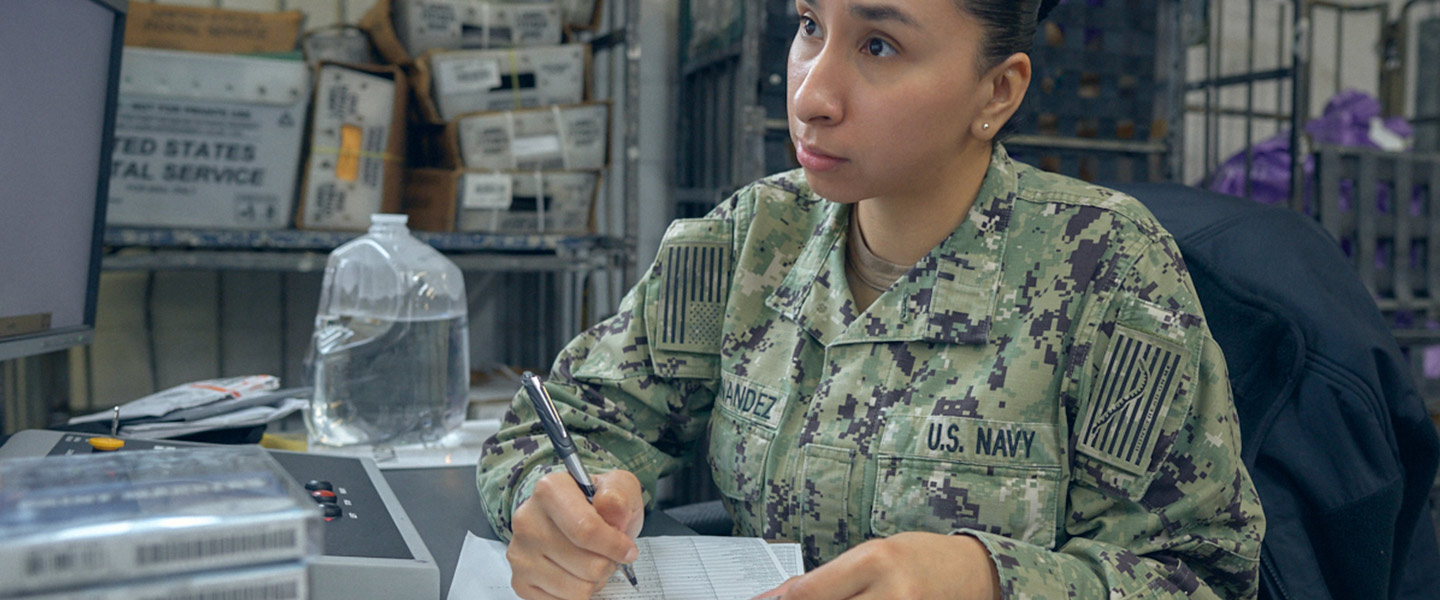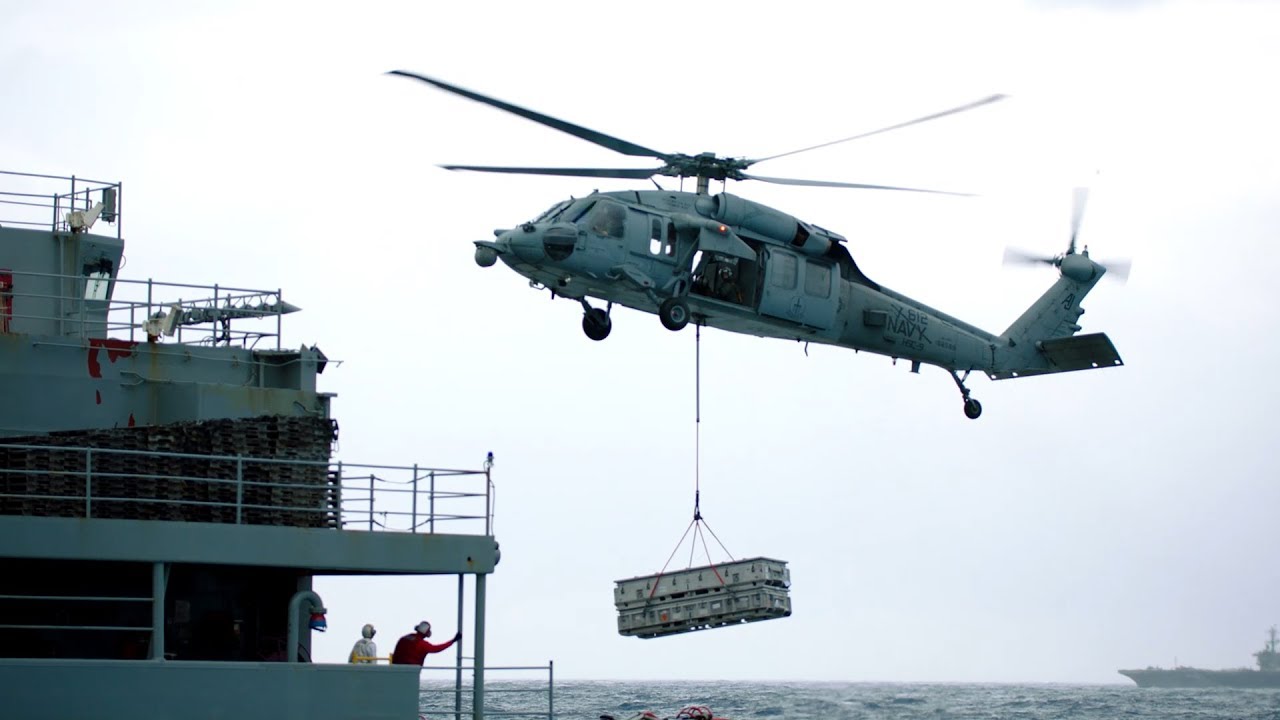What to Expect
More Information
Responsibilities
As a Logistics Specialist (LS), your efforts are crucial in delivering what the Navy needs for mission success. There are two classifications of Logistics Specialists depending on whether you choose to serve on submarines, both with corresponding responsibilities:
Logistics Specialist (LS)
- Order, store, check and issue flight gear, repair parts and other equipment and goods
- Organize and operate Navy post offices, ashore and afloat
- Receive, sort, inspect and deliver arriving mail and cargo
- Maintain inventory database and prepare reports and correspondence
- Maintain financial logs and records
- Operate computer systems that provide logistic support information
Logistics Specialist Submarine (LSS)
- Manage inventories of repair parts/general supplies for submarines and shore-based activities
- Operate Navy post offices, ashore and afloat, including distributing mail for submarines
- Order, store, check and issue equipment and goods
- Receive, sort, inspect and deliver arriving mail and cargo
- Maintain inventory database and prepare reports and correspondence
- Maintain financial logs and records
- Operate computer systems that provide logistic support information
Work Environment
Logistics Specialists work in offices, shore-based warehouses, air cargo terminals at naval air stations and aboard ships. Logistics Specialist Submarines (LSS) have the opportunity to serve on subs. The diverse working locations provide a variety of opportunities for expanding knowledge and skills in inventory management, financial management, procurement and warehouse management.
Training & Advancement
Upon completion of initial training at Recruit Training Command Great Lakes (known as Boot Camp), you’ll report for specialized training including:
Class “A” Technical School (9 weeks) in Meridian, MS, for training on automated data processing systems, financial records and accounting systems and postal operations training.
After “A” School, Logistics Specialist Submarines (LSS) candidates will continue their training:
Basic Enlisted Submarine School (9 weeks) in Groton, CT, for training in basic submarine systems. Note that this training is only for Logistics Specialist Submarines.
After completing training, Logistics Specialists and Logistics Specialist Submarines will receive their first assignments. Logistics Specialists may be assigned to ships or shore stations, while Logistics Specialist Submarines may be assigned to submarines or shore stations.
Promotion opportunities are regularly available but competitive and based on performance.
Advanced Training
Advanced training as a Logistics Specialist may also be available during later stages of your career. For those with further leadership aspirations and a college degree, Officer roles may be available, providing opportunities to lead and train others.
Post-Service Opportunities
Specialized training received and work experience gained in the course of service can lead to valuable credentialing and occupational opportunities in related fields in the civilian world whether you're an LSS or LS, such as supply chain and inventory management.
Education Opportunities
Beyond offering access to professional credentials and certifications, Navy technical and operational training in the logistics field can translate to credit hours toward a bachelor’s or associate degree through the American Council on Education.
You may also continue your education through undergraduate degree opportunities like the Navy College Program and Tuition Assistance and the Post-9/11 GI Bill.
Qualifications & Requirements
A high-school diploma or equivalent is required to become an Enlisted Sailor and a Logistics Specialist. All candidates for this rate must be U.S. Citizens or Permanent Residents.
Logistics Specialists must be able to work well with people in a customer service environment. Good arithmetic, verbal and writing skills are important, as is the ability to keep accurate records and perform detailed work.
Logistics Specialists who wish to serve aboard submarines as an LSS must volunteer for submarine service. All candidates for this rate must be U.S. Citizens.
General qualifications may vary depending upon whether you’re currently serving, whether you’ve served before or whether you’ve never served before.
Part-Time Opportunities
Serving part-time as a Navy Reserve Sailor, your duties will be carried out during your scheduled drilling and training periods. During monthly drilling, Logistics Specialists in the Navy Reserve typically work at a location close to their homes.
For annual training, you may serve anywhere in the world, including locations in the U.S., at bases overseas, or in areas where humanitarian needs are great.
Take a moment to learn more about the general roles and responsibilities of Navy Reserve Sailors.
Most of what you do in the Navy Reserve is considered training. The basic Navy Reserve commitment involves training a minimum of one weekend a month (referred to as drilling) and two weeks a year (referred to as Annual Training) – or the equivalent of that.
Logistics Specialists in the Navy Reserve serve in an Enlisted role. Before receiving the ongoing professional training that comes with the job, initial training requirements must be met.
For current or former military Enlisted servicemembers, prior experience satisfies the initial Recruit Training requirement, so you will not need to go through Boot Camp again.
For those without prior military experience, you will need to meet the initial Recruit Training requirement by attending Boot Camp in Great Lakes, IL. This training course will prepare you for service in the Navy Reserve and count as your first Annual Training.

































































































































